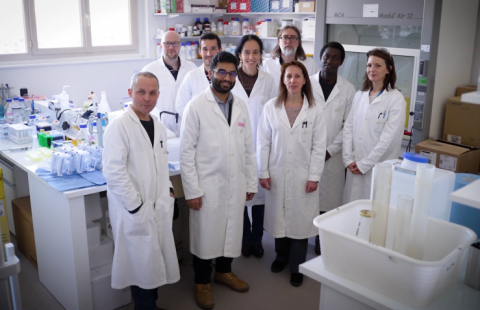The therapeutic efficacy of certain anti-cancer vaccines depends on how they are administered. This is what the team of researchers headed by Eric Tartour at the Paris-Centre de recherche Cardiovasculaire (Université Paris Descartes, INSERM Unit 970 PARCC, AP-HP), in collaboration with researchers from the CNRS[1], have just demonstrated. A paper on the subject was published on 13 February 2013 in Science Translational Medicine. In the case of so-called mucosal cancers of the lungs or ENT area, the vaccine should be administered directly via the mucosa if it is going to be effective (intra-nasally for example). The same vaccine administered in the usual way that immunisation is performed, i.e. intramuscular or sub-cutaneous injection, will be ineffective. In this research, the investigators also identified an important method by which the vaccine acts against tumours. These results will have a major impact on the creation and effectiveness of anti-cancer vaccines targeting mucous tumours.
Vaccines to treat cancer represent a new and promising avenue of therapy. The aim is to stimulate certain cells in the immune system, such as the T-CD8 lymphocytes, in order to cause the tumour to shrink. Many hopes are being pinned on these types of vaccines. Numerous trials are currently in progress, but some have suffered setbacks in the clinical phase even though they proved successful on animal models.
So as to understand why this happens, Eric Tartour and his team (Université Paris Descartes, INSERM Unit 970 PARCC, AP-HP) used mice to test the efficacy of two different routes of administration, the intramuscular route, on the one hand, and the intranasal route on the other. The tests were performed on a candidate vaccine against mucous, oropharyngeal cancers developed in collaboration with Ludger Johannes at the Institut Curie.
They proved that only vaccination via the mucosa will shrink a tumour in the lung or the ear, nose and throat (ENT) area. The same anti-cancer vaccine administered in the usual immunisation way, i.e., intramuscularly or subcutaneously, is ineffective.
“Our results may explain the failure of anti-tumoural vaccines designed to treat tumours of the mucosa in humans, and should lead to a change in how anti-cancer vaccines are used to target mucosal tumours”, explained Eric Tartour, Professor at Paris Descartes University and hospital doctor at the Hôpital Européen Georges Pompidou (AP-HP).
To try and explain the difference in efficacy, researchers sought to identify the mechanisms that operated differently depending on the method of administration. They showed that vaccination through the mucosa caused a certain protein (the mucous integrin CD49a) to be produced that enabled the T-CD8 lymphocytes (whose production is stimulated by the administration of the vaccine) to migrate into the tumour. Once they are at the site of the tumour, the T-CD8 lymphocytes destroy the cancerous cells.
In the opposite case, if this molecule is blocked it prevents the penetration of T lymphocytes into the mucosal tumour and prevents their anti-tumoural activity. The integrin CD49a is essential in the promotion of migration of the anti-tumoural lymphocytes produced through vaccination in the case of pulmonary tumours and ENT tumours and thus the efficacy of the vaccination in combatting mucosal cancers.
To check the applicability of these results in humans, the researchers analysed samples from patients suffering from lung cancer. Here again, they demonstrated the elevated expression of mucosal integrin CD49a on T-CD8 lymphocytes present in patients with lung tumours[1].
These results are encouraging for the future extrapolation of the study to humans.
[1] Travaux menés par Laurence Zitvogel, Unité immunologie des tumeurs et immunothérapie (Université Paris-Sud/Inserm) ; Institut Gustave Roussy, Villejuif
[1] Laboratories involved: Unité de pharmacologie chimique et génétique et d’imagerie (CNRS/Université Paris Descartes/Inserm/Chimie ParisTech); Compartimentation et dynamique cellulaires (CNRS/Institut Curie/UPMC).


